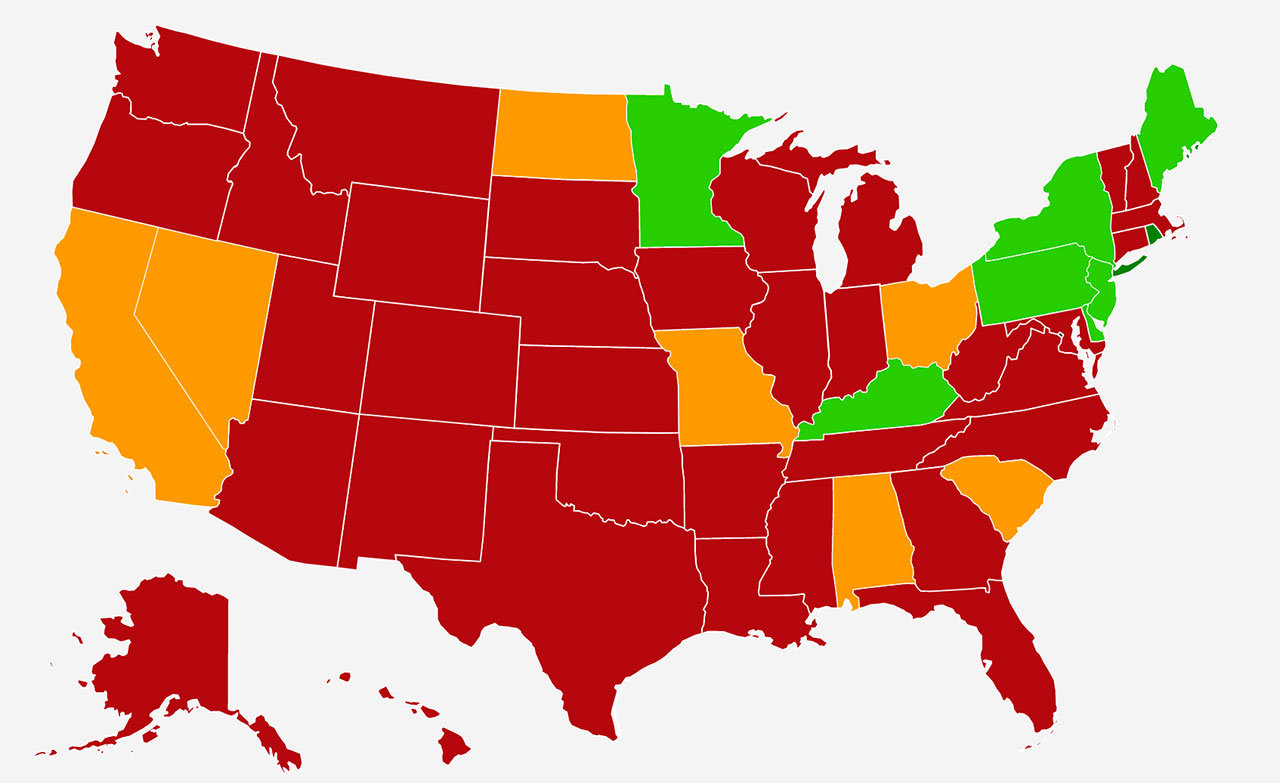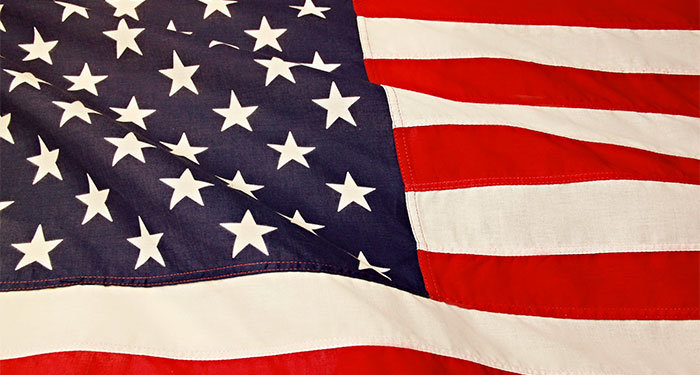Legal online casinos for USA players
As you probably know, there is no simple answer to the question whether or not online gambling is legal in the United States. Reason for this is that the laws on online gambling vary per state. Also these laws can change in the future making the rules for online gambling stricter or looser depending on who is calling the shots. And this is not a simple case of either a republican or a democrat at the wheel.
Online gambling forbidden for players in most USA states
When it comes to the legalisation of online gambling in America, there are both Republicans and Democrats who oppose it. There are also Republicans and Democrats who support it. Indeed, the issue of legalising U.S. online gambling is a controversial one, and it’s difficult to predict who will support or reject the cause based on political party affiliation alone.
We also need to make a distinction in the types of online gambling. Sometimes a state allows for example online sports betting but prohibits online casino slots and online poker.
Last but not least, in this article we are talking about wether or not it is legal for an American player to gamble online. The rules and regulations may differ for online casino operators. Also many online casino operators are located outside of the United States so this makes it harder for state authorities to fine or prosecute them. We see this in many other countries too where online gambling has not yet been legalised.

| Not Illegal / Probably Legal / Quite Legal | |
| Ambiguous / Conditionally Illegal | |
| Almost / Patently Illegal |
American states where online gambling is not illegal / probably legal / quite legal for players
At the moment (July 2020), internet gambling is only fully permitted in five states: New Jersey, Nevada, Pennsylvania, West Virginia and Delaware. Other states are pushing to legalise the activity within their borders, and there has even been talk of a merger between New Jersey and Nevada that would expand the boundaries within which those states’ citizens can remotely gamble. Also there are states where online gambling is probably legal or at least not illegal based on current laws.
- Delaware
- Kentucky
- Maine
- Minnesota
- Nevada
- New Jersey
- New York
- Pennsylvania
American states where online gambling is ambiguous / conditionally illegal for players
- Alabama
- California
- Kentucky
- Maine
- Minnesota
- New York
- North Dakota
- Ohio
- Rhode Island
- South Carolina
American states where online gambling is almost / patently illegal for players
- Alaska
- Arizona
- Arkansas
- Colorado
- Connecticut
- Florida
- Georgia
- Hawaii
- Idaho
- Illinois
- Indiana
- Iowa
- Kansas
- Kentucky
- Louisiana
- Maryland
- Massachusetts
- Michigan
- Mississippi
- Missouri
- Montana
- Nebraska
- New Hampshire
- New Mexico
- North Carolina
- Oklahoma
- Oregon
- South Dakota
- Texas
- Utah
- Vermont
- Virginia
- Washington
- West Virginia
- Wisconsin
- Wyoming
The history of online gambling in the United States
The first online casinos came online in 1994, so this is over 25 years ago. The operators of these sites were mostly based in locations like the Isle of Man, Gibraltar and Antigua but they happily accepted customers from the all over the world, including the United States.
By 1996, a First Nations group near Montreal, Quebec, Canada set up a gaming commission and started issuing licenses to online poker and casino sites on North American territory. This group was the Mohawk Territory of Kahnawake and the commission was known as the Kahnawake Gaming Commission. The Kahnawake Gaming Commission is the official licensing and regulating authority for gaming activity within and from the Mohawk Territory of Kahnawake.
The number of online gambling websites around the world grew rapidly from a couple of dozen to hundreds and hundreds in different shapes and sizes. By 1998, the estimated revenues from online gambling were well over $800 million.
Online gambling on the radar of US lawmakers
A year later, the US Senate made its first attempt to ban online gambling with the introduction of the Internet Gambling Prohibition Act. This bill did not pass.
In 2002, the United States Court of Appeals for the Fifth Circuit ruled the Federal Wire Act prohibits sports betting, but not necessarily online gambling. However, the US Department of Justice disagreed, claiming all online gambling is illegal in the US, and that advertising online gambling is akin to aiding and abetting a crime. In 2004, search engines Google and Yahoo! pulled all online gambling advertising from their platforms.
The unlawful internet gambling enforcement act
In September 2006, the US Congress passed the Unlawful Internet Gambling Enforcement Act (UIGEA) as a part of the SAFE Port Act. This act made it illegal for US banks to process transactions for online gambling sites. President George W. Bush signed the bill into law in October and a number of online gambling operators immediately pulled out of the US market.
However, The online gambling industry kept growing and many operators continued to accept US customers. The offshore operations skirted around the new banking laws in a variety of creative ways. By 2008, the estimated worldwide online gambling revenues had hit a staggering $21 billion.
Online poker’s Black Friday
On April 15, 2011, three of the largest online poker operators in the world were indicted on various charges including violating the UIGEA. These sites included PokerStars, Full Tilt, and Absolute Poker. Access to these websites from the US was shut down and the massive US online poker market was effectively closed. This day became known as Black Friday in the online poker community.
It was ultimately exposed that Full Tilt had failed to segregate player funds and paid out millions in to its owners. A settlement was reached that included PokerStars buying Full Tilt and paying back US players who were financially disadvantaged.
The Wire Act
In December 2011, the DOJ released a legal opinion that the Federal Wire Act only applies to sports betting. This paved the way for individual states to begin to consider online lottery sales, and ultimately online poker and online casino games.
The new legal online gambling act
In the summer of 2012, Delaware became the first state to legalize online gambling, passing the Delaware Gaming Competitiveness Act. In February 2013, Nevada became the second state to legalize online gambling, authorizing the issue of online poker licenses. No more than a week after this, New Jersey became the third state to legalize online gambling, authorizing the issue of both online poker and online casino licenses to casinos in Atlantic City.
In April 2013, the first legal online gambling site in the United States went live in Nevada. It was an online poker room called Ultimate Poker. By November, online poker and online casinos went live in Delaware and New Jersey.
In 2017, Pennsylvania became the fourth and largest state to pass legislation regulating online gambling. Both online casinos and an online poker room launched in 2019.
In 2018, the Supreme Court overturned PASPA, which ignited a wave of interest across several states in authorising sports betting, including online sports betting. In 2019, the DOJ released a revised Wire Act opinion. The impacts of that new opinion on legal online gambling remains unclear but will no doubt see more states changing their laws on online gambling.






Leave A Comment